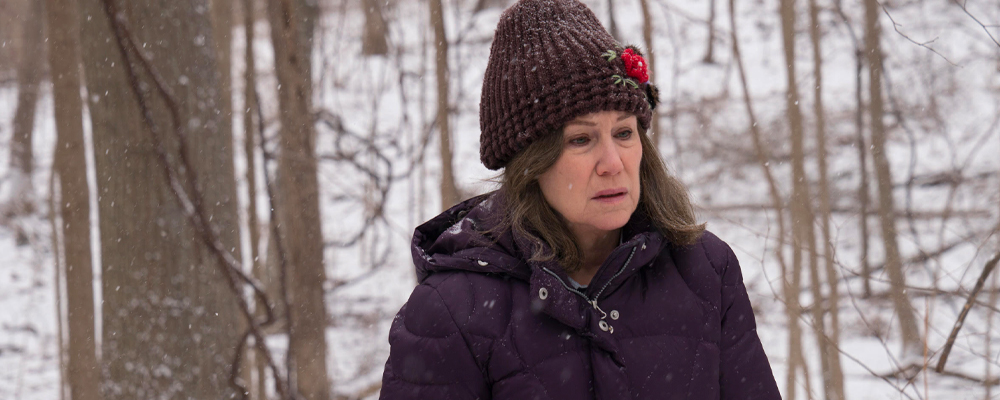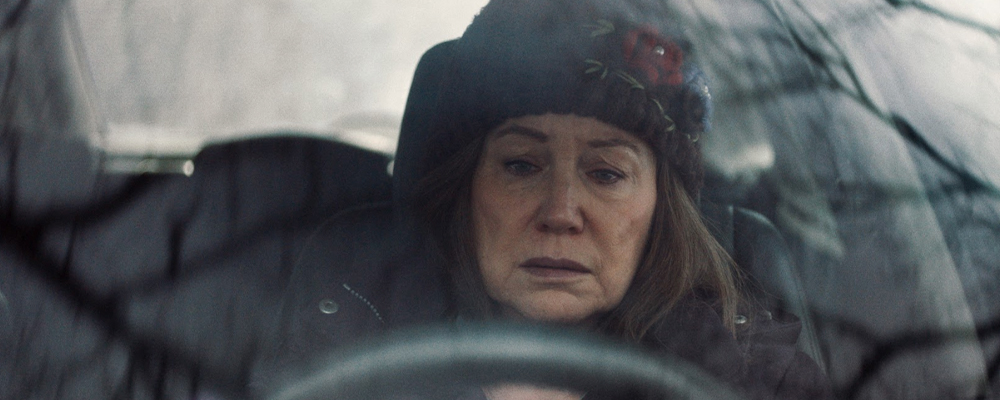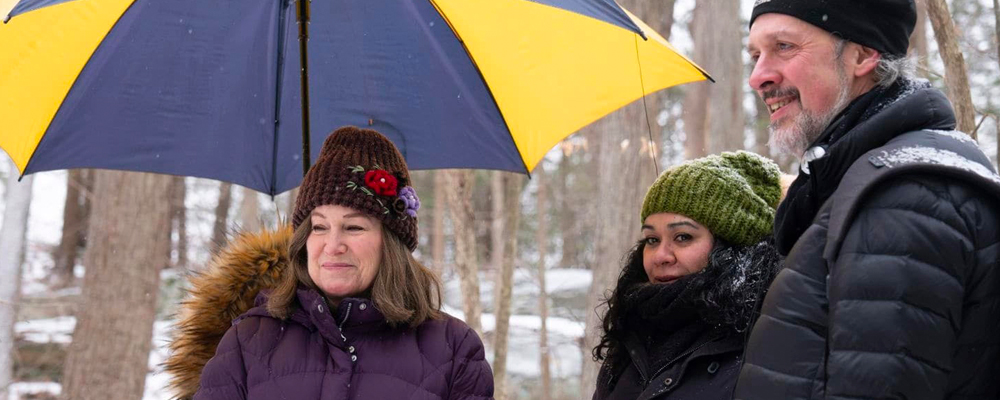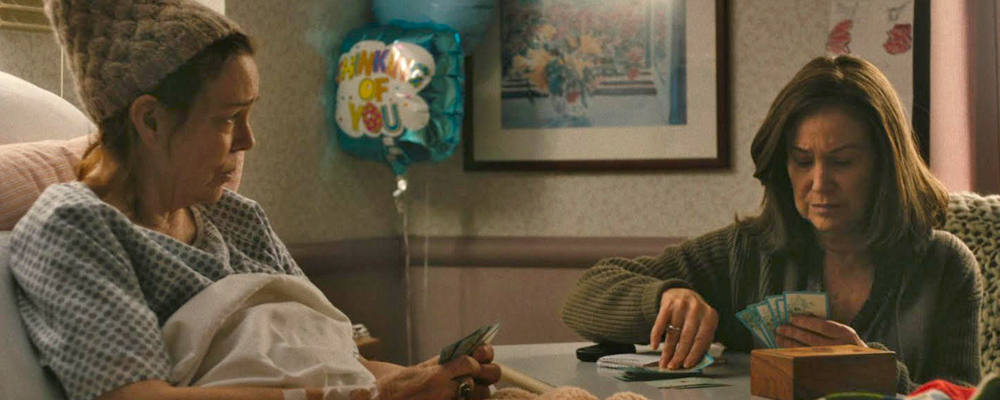Mary Kay Place Explores Guilt and Addiction in Kent Jones’ Subtle yet Powerful ‘Diane’
Sandra Miska
For his feature directorial debut, filmmaker Kent Jones found inspiration in a familiar place — the women in his own family. The result is “Diane,” a striking drama in three acts following single woman in her 60s. Diane (Mary Kay Place) focuses almost all of her energy on helping others, particularly her son Brian (Jake Lacy), a young man who is first introduced in the throes of drug addiction.
“It’s a very odd duck of a film, I think,” said Place, who recently sat down with Entertainment Voice alongside Jones.
Jones, who initially conceived of the premise for “Diane” as a teenager observing his great aunts, explained how his idea evolved over the years, particularly after he witnessed someone close to him battle a drug addiction. But it was the idea of working with Place that gave him that final push to pen the screenplay.
“I had seen ‘The Rainmaker’ by Coppola and her performance was like, ‘Oh, I have to write it for her,’” recalled the filmmaker. “When we met, I told her what I had in mind, and she just wanted very patiently for me to send her a draft, which I did, eventually.”
“I literally had a feeling of shock, this feeling going through my body,” said Place of her initial reaction to Jones and his proposal. “It surprised me. it was like a foreshadowing clue that something might happen that would be unusual and interesting.”
Several months later, the script arrived in Place’s inbox, and she recalled her first reading of it as being a rare experience, as she was so captivated that she finished it in one sitting.
“Immediately, I thought, ‘I know how to play this woman.’ Even though I didn’t know how to play her in the moment, I felt like I could figure it out,” recounted Place. “I have versions of Diane, but I’m not Diane. I’m a very strongly opinionated person and I don’t serve people like that.”
Jones begged to differ: “You’re very caring and you look out for your friends and stay connected.”
To that, Place replied, “I do do that, but I don’t have the free lifestyle and time to be as generous with people as she is in the way of picking them up and making them casseroles and delivering them from school.”
Place speaks of Diane’s daily life, with mostly entails of caring for others, doing small things like bringing foods to friends, as well as offering emotional support to a cousin in the latter stages of cancer, Donna (Deirdre O’Connell). At first glance, Diane seems like a typical woman who acts out of compassion and caregiver tendencies. And while that is true, the deeper one gets into the film the more apparent it becomes that there’s another force driving her: guilt.
“I think all of us have things that we’ve done and regret and feel shame about,” said Place. “Maybe some of those things we have trouble forgiving ourselves or letting go of. I think that’s a really universal human experience.”
While feelings of guilt are certainly universal, “Diane” does an excellent job of illustrating how deeply shame and anxieties take hold of especially women. Jones recounted an incident he observed that had a profound impact on him.
“I remember my ex-mother-in-law during one morning. I was waking up and I could hear her [pacing] up and around the stairs. My ex-wife asked her, ‘What’s up?’ And she said, ‘I just don’t have anything to worry about.’ So she was wracking her brain to try and find something to worry about.”
When it comes to Diane’s “shameful” past, details slowly emerge, but a full picture is never painted. This was a deliberate choice made by Jones, and wise one, as it keeps the focus on Diane and her journey forward. However, it was imperative for Place to know the truth in order to tap into her emotions.
“I did a complete and total backstory of exactly what my character went through, because I had to know for myself what it was. I spent weeks creating my history in that town, how I met my husband,” explained the actress. “I knew specifically what happened, even though I didn’t talk about it specifically… If it’s just a vague idea, it doesn’t work. You have to know exactly what you’re talking about even though the audience may not know.”
Added Jones, “You don’t know what it is, but at the same time, if Mary Kay hadn’t done that work, if I hadn’t done that work, and we hadn’t known what it was that we weren’t sharing in words with the audience, you feel it. You can’t just create ambiguity to feel ambiguity; you have to know what it is you’re leaving out.”
Much of the first part of “Diane” deals with addiction and the helplessness the title character feels when it comes to her only child. The situation gets interesting in the second part after Brian kicks drugs and finds Jesus, turning the tables on his mother, pleading with her to attend his church like she once pleaded with him to seek treatment. For Jones, it was important that Lacy’s character comes off as authentic as possible, not like a “movie addict.”
“Jake really got that. He got the boorish, grating part of addiction,” he said. “He really got that in his marrow, and he understood that translation from one form of addiction to another and the kind of domineering behavior it can create and take up all the oxygen.”
Brian’s recovery, as well as the passing of numerous friends and close relatives, eventually frees up much of Diane’s energy, and Place shines during these quiet, reflective moments. Writing, of all things, proves to be therapeutic to her in these final years, as she wisely channels her thoughts and emotions into journaling.
“I think in slivers she comes more to consciousness and learns how to forgive herself, but it’s not until she starts writing in her journal and slows down long enough to understand what she feels about something,” explained Place. “Generally, she’s just so busy doing all this stuff to not think about it.”
As heavy as “Diane” can be, Place found the overall experience enjoyable. “It was fun to figure out the beats, the details, and the emotional landscape.”
“Diane” opens March 29 in New York, Los Angeles and VOD.




